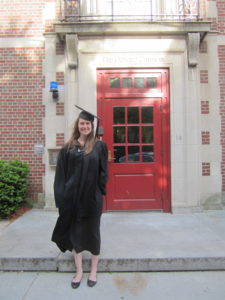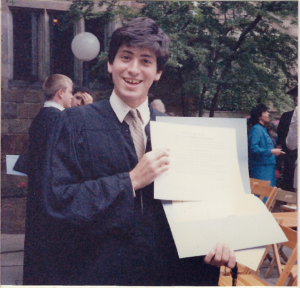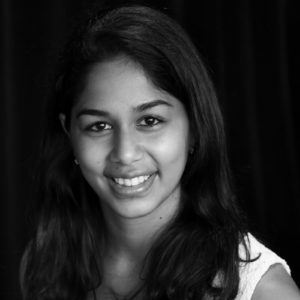
In 1974, science journalists from nine European countries met in Salzburg, Austria, to discuss the future of the field. It didn’t take long for a major divide to appear.
Britain and Switzerland saw science journalism as a graduate profession, wrote Martin Sherwood, science policy editor for New Scientist at the time. They foresaw a future in which nearly all science journalists would have degrees in science. But Austria and the U.S. were moving toward a trend of science journalists having degrees in journalism.
More than 40 years later, that debate continues. Do you need a science degree to be a science journalist?
It’s a question unique to the beat. Journalists covering crime or education are not typically expected to have a degree in those subjects. But science journalism is often considered a more technical and knowledge-heavy beat. And while some people come to it from other journalism beats, or with degrees in English or history, many also have a background in science: space writers who studied astronomy in college or graduate school, or health reporters who were doctors in a previous life.
Such scientific training can prove useful in science journalism, but for every benefit the years spent earning a science degree may bring—from gaining technical knowledge to understanding a scientist’s daily life and avoiding common science interpretation errors—there’s a potential drawback, too. When science reporters from varied backgrounds analyze their experiences, they can see the way these journeys have helped or harmed them.
Deep Subject-Area and Technical Knowledge
Here’s how a science degree might work in your favor:
One thing that sets science journalism apart from other beats is the technical knowledge it often requires. From knowing how to read research papers to delving into medical procedures and understanding theories of physics, there’s a lot to digest. Having some of this knowledge from a science background can make it easier.
Even just having a basic scientific vocabulary—understanding concepts such as statistical significance and peer review and appreciating the difference between hypotheses and theories—can be useful, says Sarah Zhang, a staff writer at The Atlantic who studied neurobiology as an undergraduate at Harvard. In interviews for stories about genetic engineering, she’s found it useful to show her understanding of basic molecular biology: the difference between RNA and DNA, for example. “That way when you’re talking to scientists, they don’t have to go through basic concepts or use imprecise language,” Zhang says. “It also gives them a level of comfort that you’re someone who has some technical fluency.”
For freelance writer Laura Kiesel, one of the main assets of her graduate work in natural resources and environmental policy is how it taught her to read scientific articles and understand the nuances of findings. That recently came in handy, she says, in writing about the correlation between mass shootings and “toxic masculinity.” She used many studies to support her case, so it was crucial to properly interpret the findings and understand how statistically significant they were. “I think that’s an issue a lot of journalists and editors without science backgrounds struggle with,” she says.
Here are some potential drawbacks:
Scientific expertise can have its downsides too, making it difficult to produce compelling stories for a general audience.
The first hurdle can come during the interviewing process. If a scientist feels a reporter understands the jargon of their field, they may be more tempted to use it during an interview. And jargon doesn’t make for good quotes.

That’s one reason why STAT reporter Rebecca Robbins, a former history major, feels her non-science background is useful. There are often times in an interview where concepts go over her head, she says. “I think that demands some degree of humility to be able to acknowledge to the scientist that ‘I don’t understand what you’re talking about.’”
But it ultimately benefits her readers, as she’s able to explain difficult concepts in a way that’s palatable for the average person. “I never, as a reporter, want to take for granted that people know what I’m talking about,” Robbins says.
A deep background in a scientific subject can also sometimes make it difficult to write about that topic clearly and compellingly, says Carl Zimmer, an English major from Yale who has gone on to become the author of 13 nonfiction science books and is a regular contributor to STAT and The New York Times.
It’s a challenge he witnesses firsthand when teaching science writing classes. Students with science majors are sometimes tempted to “dump data on a page,” Zimmer says. But the craft of storytelling is just as important to science journalism as the science component.
That’s why Zimmer insists all science writers, especially if they’re coming from a science background, should practice the craft of storytelling by reading great writing, analyzing what makes it effective, and using that to build their own narratives around the science they cover. “It’s important to remember in science journalism that pretty much no one has to read what you write,” he says. Most science writers, he notes, are not breaking news that affects people’s daily lives. “So you have to ask yourself how you’re going to keep them reading. And I’ve found that telling stories is a very effective way.”
Being Part of the Science World
Here’s how a science degree might work in your favor:
Studying science opens up doors to unique worlds: the day-to-day work inside a research lab, the behind-the-scenes of clinical care, the politics of grant funding. Being a part of these worlds can provide journalists from science backgrounds a special advantage in gaining credibility with sources, landing jobs, and understanding the daily lives of the people they interview.
Ivan Oransky, co-founder of Retraction Watch, says his medical background plays a large role in his journalistic work today. His MD helped him land some of his early jobs with trade publications, and later Reuters Health and MedPage Today. “In general, there is an appetite in a lot of newsrooms for expertise and people who know things but don’t have to learn on the job,” he says.
And it was his work writing for the now-defunct medical-student section of the Journal of the American Medical Association that eventually led him to launch Retraction Watch, which covers retractions in science journals. “It’s really about the process of research at a meta level,” Oransky says, “so you need to understand it to cover it.” He picked up that knowledge, which includes understanding how misconduct can poison scientific research, from years of tracking the latest health studies in medical school.
Similarly, the time Zhang spent in a research lab studying fruit flies made her privy to the daily life of a scientist. She learned how research papers are written, what it means to be first versus last author on a report, and how to look for the funding sources behind a study. That insider perspective has helped her understand how to approach process-oriented stories and scientist profiles, she says. “Science is not just a bunch of facts to memorize, but a process of discovery,” she says. “I try to capture that in my writing.”
Holding a scientific or medical degree also affords writers some level of automatic credibility among scientists. Oransky says when he started out in journalism, he made sure to include “MD” in his email signature. “I knew it would make doctors comfortable talking to me,” he says. “And they were probably more likely to call me back because of that.”
Gaining credibility can be more difficult for reporters without a background in science. Zimmer says people are sometimes “shocked or mortified” that he wasn’t trained as a scientist. Some readers who disagree with his work for ideological reasons will even try to use his English degree against him—by arguing that he doesn’t have the necessary expertise to be trusted. “But that doesn’t bother me,” Zimmer says. “I can show scientists the articles I write and let them judge whether I got it right or not.”
Here are some potential drawbacks:
Being part of the science world can also raise concerns about objectivity and a journalist’s ability to see the bigger picture. Science journalists may be accused of bias when writing about their own field. And sometimes that criticism is valid, Oransky says. “The question is, are they able to distance themselves from people who [could have been] their colleagues? Do they get defensive when someone questions their former profession?” That can interfere with the journalistic goal of considering and fairly representing multiple perspectives.

Being deeply embedded in one profession can also make it difficult to step outside that world. Zhang says she spent much of her first year in journalism writing solely about neuroscience. “In some ways, it can be hard to get out of your little hole,” she says. “But I think that goes away eventually.”
That’s where Zimmer sees his background as an advantage. It leads him to “tell stories that start from a different place.” For instance, his latest book, She Has Her Mother’s Laugh, is about heredity. Scientists he’s talked with often assume that by heredity, Zimmer means genetics. But he doesn’t view heredity solely through a scientific lens; he thinks of the idea of what we carry on from our forebears as a powerful societal concept, as well. “I think that my interest in the concept as something that guides people’s lives and that they use to define themselves comes out of my non-science background,” he says.
Approaching topics that way can engage a larger audience, Robbins adds. STAT’s audience, she notes, includes not only scientists and those in the medical industry but also readers from other backgrounds. Robbins wants her stories to appeal to all of them. “I would never say I’m trying to just write for people in the industry,” she says. “Ideally, I’d like my stories to be as widely read as possible.”
Understanding Consensus and Avoiding False Balance
Here’s how a science degree might work in your favor:
Science journalists have the power to affect public perception and thus, public policy. It’s important that journalists have enough scientific knowledge to wield that power responsibly, Kiesel says. One essential skill is the ability to avoid setting up false equivalence.
This journalistic sin is especially prominent in climate journalism. For years, journalists portrayed the evidence for and against human-caused climate change as equal, despite an overwhelming consensus on one side. That contributed to a persistent and, many argue, damaging misunderstanding among the American public.
It was recognizing the lasting legacy of that error that motivated Kiesel to go back to school to study environmental policy, six years after earning her undergraduate degree in English and journalism. What too few journalists understand, she says, is that “science journalism can’t be approached the same way an ideological topic is approached.” Reporting on policy-relevant issues such as climate change is not about simply reporting both sides—it’s about understanding what the scientific consensus is and where the evidence is strongest, and then conveying an accurate picture of that to the public. “I see a lot more intricacies in these topics than I did before I went to a science program,” Kiesel says.
Here are some potential drawbacks:
While deep knowledge about science can help journalists avoid false balance and produce more thorough stories, the passion that often comes with that knowledge poses the danger of leading journalists into the realm of advocacy. That can raise concerns about objective reporting. After all, communicating the science you know to readers is not the same as reporting out a story to include diverse perspectives and provide more nuance, says Robbins of STAT. It is the latter, she notes, that helps makes stories richer.
It also makes a piece stronger to get a consensus—when one exists—from speaking with multiple sources rather than relying on your own knowledge, Robbins says. In a story she wrote about a new genetic fertility test, she conducted in-depth interviews with several reproductive endocrinologists before concluding that the company’s claims about the test were oversold.
“The ability to report well, write well, and ask the right questions can help someone understand what they need to understand,” she says, “even if you don’t have a science degree.”
Bottom Line: Choose Your Own Path
There is no scientific way to become a science journalist. No perfect formula. No universal law to depend on. Instead, it’s about gaining the right combination of skills and knowledge, which can be done in a number of ways. Some, like Zimmer, read textbooks in their free time, while others, like Oransky, spent years training in medical school.
No matter which path one chooses, the most important thing is to simply be open to learning all the time, says Oransky. Studying biology, chemistry, or any other field of science can give you a foundation for science journalism, but ultimately this career is built on curiosity. “If you’re curious and always willing to prove yourself wrong, then you’re going to be a good reporter,” he says. “As much as a degree helps you do that, it’s great. But if it’s going to close your mind and make you think you know everything, then journalism is not for you.”

Aneri Pattani is a TON fellow sponsored by the Burroughs Wellcome Fund. She is a health reporter at The Philadelphia Inquirer, where she covers health issues in young people. In the past, she has worked as an assistant producer on the health team at WNYC, a James Reston reporting fellow on the health/science desk at The New York Times, and a reporting companion to columnist Nicholas Kristof in Liberia. She has also written for The Boston Globe, The Texas Tribune, CNBC, and The Hartford Courant. Originally from Connecticut, she graduated from Northeastern University in Boston in May 2017. Outside of reporting, Pattani loves to travel, cook, and practice Indian classical dance. Follow her on Twitter @aneripattani.


